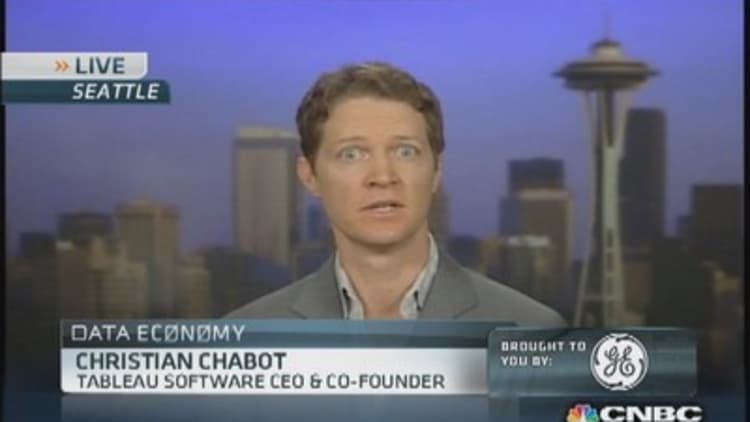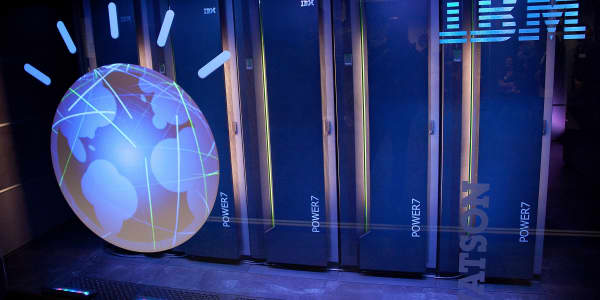The latest news on the companies and trends from the fast-evolving world of the Data Economy:
Witness the incredible wealth amassed by overgrown teenagers with computers for brains and with the help of wise old venture capitalists in Silicon Valley and who hasn't had the envious thought that these social media entrepreneurs are getting rich at our expense? Or at least, getting rich on the backs of our bits—of data.
Facebook and Twitter and the like have actually gotten away with financial metrics used to impress Wall Street that would make Warren Buffett shudder to think anyone spent a dime on them, let alone actually based a company valuation on, things like revenue per tweeter. And Twitter has made a big deal out of the revenue it is bringing in through sale of user data to third parties, alongside its plans to become an advertising giant.
The truth, though, is that your data really ain't worth much. Oh, it may be worth a lot to a Facebook or Twitter, or a Pinterest—now valued at near-$4 billion without a cent of revenue to speak of—because to these social media giants your data is just part of a vast pool of data that in the aggregate, and only in the aggregate, derives its value.
Think of this nonprofit example: If you give your genetic data to medical researchers, they may be able to combine it with the data from millions of other people and create blockbuster drugs. But would that entitle you to a cut of Pfizer's profits?
Your data only has value when it becomes part of an anonymous human data pool, and so, the value goes to the aggregator, never the aggregated. The cog versus the machine, ad infinitum down through the history of capitalism. Why just think of what a company could get for amassing the data trails of 400,000 individuals and selling it to third party marketers.
Well, it turns out you don't have to imagine that, and it's not as much as you might have expected either. This past week, the state of New Jersey closed a case against a company accused of "history sniffing."
(Read more: 10 surprising ways companies use your private info)
Gawker made the case most plainly that your data ain't worth much, though it did less of a good job in explaining the facts of the case, though, hey, it is Gawker.
The New Jersey Division of Consumer Affairs uncovered a scheme—apparently with the help of a Wall Street Journal report from a few years ago—in which the analytics company Dataium (which focuses on car buying behavior) conducted online "history sniffing" and then sold personal data on 400,000 individuals to another analytics company, Acxiom.
This data included names, phone numbers, email addresses, and information from car dealer websites, search engines and new article searches, all to focus in on carbuying preferences. And Dataium got paid a grand total of $2,500 for the data innards of 400,000 individuals—or, according to our count, less than a penny a person, actually, closer to half a penny a person. The company ended up agreeing to a fine of $99,000—so you're worth a little more in the legal system's analysis.
There is little doubt your data's value to the world's snoop-happy governments. The intelligence-Silicon Valley complex may replace the military-industrial complex, and one day President Hillary Clinton's 2024 farewell address to the U.S. public will warn of this monster. But until then, don't cry about those hackers getting rich and ringing the opening bell: Your data ain't worth much to them. And maybe, just maybe, that $2,500 check suggests that something smells sort of fishy among all those sniffing the data glue today.
The other, more depressing for all of us (and less envious way to look at it, if we must consider it) is that the only person lower on the food chain in the data economy than Dataium, is you, and me. Capitalism does have to have its bottom feeders. So buy Pinterest when it goes public. They are sure to be among those who the Dataiums of the world are desperate to sell your virtual scraps to.
(Read more: 10 strangest data findings to help you live your life)

In other news from the Data Economy:
Google was so fed up with the government and its snooping that it even considered leaving the U.S. as the site of its corporate headquarters, Chairman Eric Schmidt said this past Friday at the Paley International Council Summit in New York.
How do publishers pick titles for books? InformationWeek took a look at the big data behind the book jacket at HarperCollins. It also peeked at how Hollywood is trying to get its lens around big data to improve its blockbuster success ratio.
Want to know why the Weather Company's data is so valuable to beer and snack sellers? Check out the December issue of The Atlantic. The magazine is giving away the article for free online (proving the Data Economy doesn't benefit everyone), but it is the holiday season and it would be generous of you to consider a subscription and help keep one of the oldest print pubs in the U.S., co-founded by Ralph Waldo Emerson, alive.
—By Eric Rosenbaum, CNBC.com





